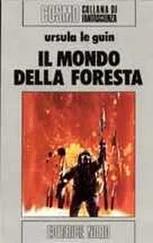“Gentlemen, this is very interesting but in a somewhat specialist frame of reference, and it may be somewhat out of the context which we’re attempting to clarify here—”
“No, excuse me, Colonel Dongh, this may be the point. Yes, Dr. Lyubov?”
“Well, I wonder if they’re not proving their adaptability, now. By adapting their behavior to us. To the Earth Colony. For four years they’ve behaved to us as they do to one another. Despite the physical differences, they recognized us as members of their species, as men. However, we have not responded as members of their species should respond. We have ignored the responses, the rights and obligations of non-violence. We have killed, raped, dispersed, and enslaved the native humans, destroyed their communities, and cut down their forests. It wouldn’t be surprising if they’d decided that we are not human.”
“And therefore can be killed, like animals, yes yes,” said the Cetian, enjoying logic; but Lepennon’s face now was stiff as white stone. “Enslaved?” he said.
“Captain Lyubov is expressing his personal opinions and theories,” said Colonel Dongh, “which I should state I consider possibly to be erroneous, and he and I have discussed this type of thing previously, although the present context is unsuitable. We do not employ slaves, sir. Some of the natives serve a useful role in our community. The Voluntary Autochthonous Labor Corps is a part of all but the temporary camps here. We have very limited personnel to accomplish our tasks here and we need workers and use all we can get, but on any kind of basis that could be called a slavery basis, certainly not.”
Lepennon was about to speak, but deferred to the Cetian, who said only, “How many of each race?”
Gosse replied: “2641 Terrans, now. Lyubov and I estimate the native hilf population very roughly at 3 million.”
“You should have considered these statistics, gentlemen, before you altered the native traditions!” said Or, with a disagreeable but perfectly genuine laugh.
“We are adequately armed and equipped to resist any type of aggression these natives could offer,” said the Colonel. “However there was a general consensus by both the first Exploratory Missions and our own research staff of specialists here headed by Captain Lyubov, giving us to understand that the New Tahitians are a primitive, harmless, peace-loving species. Now this information was obviously erroneous—”
Or interrupted the Colonel. “Obviously! You consider the human species to be primitive, harmless, and peace-loving, Colonel? No. But you knew that the hilfs of this planet are human? As human as you or I or Lepennon—since we all came from the same, original, Hainish stock?”
“That is the scientific theory, I am aware—”
“Colonel, it is the historic fact.”
“I am not forced to accept it as a fact,” the old Colonel said, getting hot, “and I don’t like opinions stuffed into my own mouth. The fact is that these creechies are a meter tall, they’re covered with green fur, they don’t sleep, and they’re not human beings in my frame of reference!”
“Captain Davidson,” said the Cetian, “do you consider the native hilfs human, or not?”
“I don’t know.”
“But you had sexual intercourse with one—this Selver’s wife. Would you have sexual intercourse with a female animal? What about the rest of you?” He looked about at the purple colonel, the glowering majors, the livid captains, the cringing specialists. Contempt came into his face. “You have not thought things through,” he said. By his standards it was a brutal insult.
The Commander of the Shackleton at last salvaged words from the gulf of embarrassed silence. “Well, gentlemen, the tragedy at Smith Camp clearly is involved with the entire colony-native relationship, and is not by any means an insignificant or isolated episode. That’s what we had to establish. And this being the case, we can make a certain contribution toward easing your problems here. The main purpose of our journey was not to drop off a couple of hundred girls here, though I know you’ve been waiting for ’em, but to get to Prestno, which has been having some difficulties, and give the government there an ansible. That is, an ICD transmitter.”
“What?” said Sereng, an engineer. Stares became fixed, all round the table.
“The one we have aboard is an early model, and it cost a planetary annual revenue, roughly. That, of course, was twenty-seven years ago planetary time, when we left Earth. Nowadays they’re making them relatively cheaply; they’re SI on Navy ships; and in the normal course of things a robo or manned ship would be coming out here to give your colony one. As a matter of fact it’s a manned Administration ship, and is on the way, due here in 9.4 E-years if I recall the figure.”
“How do you know that?” somebody said, setting it up for Commander Yung, who replied smiling, “By the ansible: the one we have aboard. Mr. Or, your people invented the device, perhaps you’d explain it to those here who are unfamiliar with the terms?”
The Cetian did not unbend. “I shall not attempt to explain the principles of ansible operation to those present,” he said. “Its effect can be stated simply: the instantaneous transmission of a message over any distance. One element must be on a large-mass body, the other can be anywhere in the cosmos. Since arrival in orbit the Shackleton has been in daily communication with Terra, now twenty-seven lightyears distant. The message does not take 54 years for delivery and response, as it does on an electromagnetic device. It takes no time. There is no more time-gap between worlds.”
“As soon as we came out of NAFAL time-dilatation into planetary space-time, here, we rang up home, as you might say,” the soft-voice Commander went on. “And were told what had happened during the twenty-seven years we were traveling. The time-gap for bodies remains, but the information lag does not. As you can see, this is as important to us as an interstellar species, as speech itself was to us earlier in our evolution. It’ll have the same effect: to make a society possible.”
“Mr. Or and I left Earth, twenty-seven years ago, as Legates for our respective governments, Tau II and Hain,” said Lepennon. His voice was still gentle and civil, but the warmth had gone out of it. “When we left, people were talking about the possibility of forming some kind of league among the civilized worlds, now that communication was possible. The League of Worlds now exists. It has existed for eighteen years. Mr. Or and I are now Emissaries of the Council of the League, and so have certain powers and responsibilities we did not have when we left Earth.”
The three of them from the ship kept saying these things: an instantaneous communicator exists, an interstellar supergovernment exists…. Believe it or not. They were in league, and lying. This thought went through Lyubov’s mind; he considered it, decided it was a reasonable but unwarranted suspicion, a defense-mechanism, and discarded it. Some of the military staff, however, trained to compartmentalize their thinking, specialists in self-defense, would accept it as unhesitatingly as he discarded it. They must believe that anyone claiming a sudden new authority was a liar or conspirator. They were no more constrained than Lyubov, who had been trained to keep his mind open whether he wanted to or not.
“Are we to take all—all this simply on your word, sir?” said Colonel Dongh, with dignity and some pathos; for he, too muddleheaded to compartmentalize neatly, knew that he shouldn’t believe Lepennon and Or and Yung, but did believe them, and was frightened.
“No,” said the Cetian. “That’s done with. A colony like this had to believe what passing ships and outdated radio-messages told them. Now you don’t. You can verify. We are going to give you the ansible destined for Prestno. We have League authority to do so. Received, of course, by ansible. Your colony here is in a bad way. Worse than I thought from your reports. Your reports are very incomplete; censorship or stupidity have been at work. Now, however, you’ll have the ansible, and can talk with your Terran Administration; you can ask for orders, so you’ll know how to proceed. Given the profound changes that have been occurring in the organization of the Terran Government since we left there, I should recommend that you do so at once. There is no longer any excuse for acting on outdated orders; for ignorance; for irresponsible autonomy.”
Читать дальше




